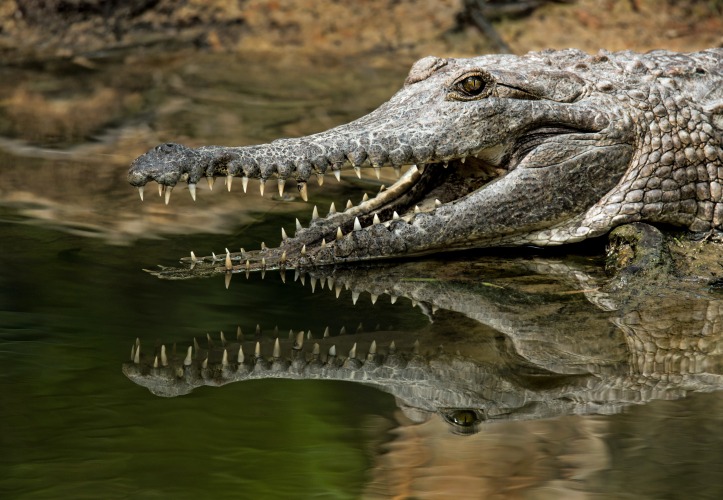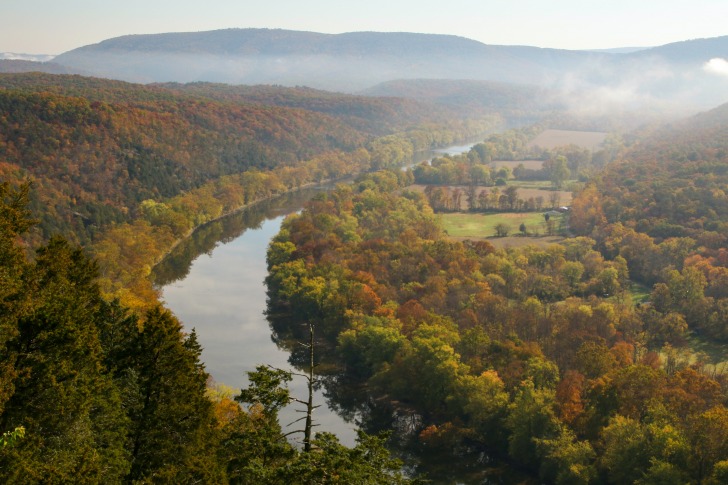Alligators have occasionally shown up in Maryland and Virginia communities since 2015, especially around the Chesapeake Bay.
The sightings are not surprising considering that humans could have transported them to this area, making the pre-historical looking reptiles appear in the mid-Atlantic region, a rare occurrence.
However, alligators are not natural habitats of Maryland or the surrounding region.
So, you will likely not encounter alligators when visiting Maryland.

Contents
Do We Have Alligators in Maryland?
While it is not strange to find alligators in Maryland, experts believe this is often due to humans attempting to pet the reptiles and later releasing them into the open.
According to alligator biologists, it is possible to find adult alligators spending time in the brackish waters, since most food resources, including the blue crabs, may be found in plenty.
However, the same experts believe that the Chesapeake Bay is too far off the north to support the population of many alligators naturally.
Findings show that North Carolina is often the furthest northernmost region for alligators to be found naturally.
Most experts believe that many of the alligator sightings in Maryland may have been due to human interference.
Some humans may have harbored the gators as illegal pets and released them into the wild for fear of being found.
Alligators are resilient reptiles that have survived years without being extinct.
However, they still require temperatures above 40 degrees to be active, not to mention that they cannot digest food when temperatures fall below 70 degrees.
With such specific temperature requirements, it is unnatural that they may thrive in Maryland in large numbers.
Normally, reptiles are ectothermic or cold-blooded animals that rely on external heat sources for body temperature regulation.
For example, the alligator’s back has an armor-like surface that acts like a solar panel.
This is why when alligators bask in the sun, they tend to get warm; the gators open their mouths to help cool them down.
Usually, alligators will not hibernate when it gets cold. Instead, they enter short dormancy periods, referred to as brumation, where their heart rates slow down and become very sluggish.
In such states, the alligators burrow inside waterside tunnels and dens and only come out occasionally to bask in the sun.
They also come out to put their nostrils above the ice to help them breathe.
During this period, the alligators quit eating, but they will keep drinking water to prevent dehydration.
Alligators cannot migrate over land because of their short legs and large bodies.
Besides, they cannot filter toxic salt levels and cannot travel north by ocean/sea.
In most cases, alligators live in swamps, slow-moving freshwater rivers, lakes, and brackish waters, which are partly salty and fresh.
The gators go into the ocean for short durations when seeking some of their favorite dishes; small sharks and crabs.
It is still unclear why these gators move into the ocean or what might have caused them to start doing so.
More research needs to be done to establish whether this results from floods.
What about finding alligators in the wild?
It is not uncommon to find alligators and other non-native crocodilians in the Maryland wild.
However, this only happens when people release these crocodilians into the wild.
What is the Species of Alligator found in Maryland?
Alligators are not indigenous to Maryland.
This means that there are no specific species of alligators in Maryland.
Instead, you will find the species based on what people have brought into space.
Is it Safe to Swim in Maryland?
Before choosing to swim in Maryland, you want to be sure that the waters are safe for you to go.
However, your safety depends on where you are.
Generally, though, most Maryland waters are safe to swim in.
It is important to note that no water is perfectly safe.
There is always the aspect of microorganisms and creatures being present in the waters, thus causing some form of pollution.
So make sure to find out about the waters you want to swim in first.
For example, when swimming in the Chesapeake Bay, do so in areas with no jellyfish.
While you don’t have to worry about alligators in Maryland, there is the challenge of jellyfish in some parts.
Jellyfish are known for their stings, some of which can be poisonous and deadly.
Rather than risk swimming in jellyfish-infested waters, avoid the waters during summer since most jellyfish are attracted to the beaches due to low salt levels in the water.
Alternatively, ensure to get into such waters only when wearing a wetsuit or pantyhose.
A common jellyfish found in the Chesapeake Bay waters includes the Chrysaora quinquecirrha.
This is one of the three species of jellyfish you are likely to encounter in these waters.
Since jellyfish are known to have a high population in summer, make sure to invest in appropriate gear if you must swim in an area.
Another risk you may want to consider before getting into the water to swim is the water quality.
It is important to ensure that the water quality is guaranteed and that there are no bacteria in the water.
Also, avoid getting into sea or ocean waters after a heavy storm unless 48 hours elapse.
You may also want to exercise caution when swimming in most of Maryland’s waters because of the high drowning cases.
Drowning is Maryland’s fifth most common cause of death, especially for small children.
This should be a factor of consideration when taking kids out with you.
You should monitor the kids closely to ensure no accidents happen on your watch.
Interesting Alligators Facts in Maryland
Maryland is not a native habitat for alligators, and neither does the state allow private ownership of these reptiles.
However, it appears as though some people have illegally managed to sneak these reptiles as pets and later release them into the wild after they become too large.
This explains the different instances where large gators have been found roaming neighborhoods, with some being found in swimming pools around the area.
A story has been told of a man and his son trapping an alligator near their favorite family pond.
The 8-foot-long alligator was found in a pond near the Chesapeake Bay.
The man is said to have used chicken breast bait to trap the gator and later shot it with a crossbow before putting the meat in his freezer.
This story created a buzz in the man’s Lusby hometown, earning him the title Crocodile Dundee.
Wildlife officials reported that this may have been a case of someone attempting to raise an alligator as a pet but failed to do it successfully, thus opting to release it.

Alligators vs. Crocodiles
While alligators and crocodiles are closely related, crocodiles tend to have longer and pointer snouts compared to alligators, which are shorter and rounder.
Usually, when an alligator shuts its mouth, you will not see any teeth, but crocodiles’ teeth tend to stick up over their top lip, which shows a toothy grin.
These are the two distinct traits that set the two reptiles apart.
The instances where alligators and crocodiles have shown up in Maryland have been due to illegal activities.
Chances are that they may have been brought into the state illegally by people who attempted to keep them as pets.
Only when they can manage their growth do such individuals release the crocodilian into the Maryland wild.
3 Safety Tips for Swimming in Alligator-infested Waters
Though they seem scary and fierce, most alligators will not harm or attack unless provoked.
This is a trait that most wild animals exhibit.
Stats show that alligators kill fewer humans in a decade compared to those killed by dogs, cats, or horses in a week.
With these, it is easy to see how harmless alligators can be.
However, this should not be confused with them being tame.
Never downplay the danger likely to be caused by alligators.
Below are a few tips to observe if you want to stay safe from alligator attacks.
Never Approach Alligators
It would be best not to assume that an alligator is safe enough to be approached.
Instead, they swim at a distance as these creatures are powerful and tend to lunge when attacking their prey.
Additionally, you may not see them coming, so keeping a safe distance is better.
Never Swim Alone
Make sure that you never plunge into an alligator-infested water source without company.
Always swim close to the crowd.
Additionally, splash water and make lots of noise when swimming.
Avoid Vegetated Shorelines, Densely Vegetated Areas, Or Remote Areas
Alligators are likely to hide in such areas.
Therefore, swim away from such spaces to be safe.
Alligators are not native to Maryland.
However, it is not uncommon to find them in this area because they have been released by someone who illegally brought them to the state.
Even so, it would be best if you were confident that they are less likely to attack you unless provoked and understand how to act around them constantly.
Maryland Safety Overview
READ THE FULL REPORT: Maryland Safety Review
Safety Index:
- OVERALL RISK: MEDIUM
- TRANSPORT & TAXIS RISK: MEDIUM
- PICKPOCKETS RISK: HIGH
- NATURAL DISASTERS RISK: LOW
- MUGGING RISK: MEDIUM
- TERRORISM RISK: MEDIUM
- SCAMS RISK: HIGH
- WOMEN TRAVELERS RISK: MEDIUM
Frequently Asked Questions
What is the average number of people who die from alligator attacks?
Alligators are less likely to lead to death if past statistics are anything to go by.
This has been proven by the number of injuries and deaths recorded between 1948 and August 2004, when only 376 injuries were reported and 15 alligator-related deaths confirmed.
This averages to about one fatality a year.
What is the ideal temperature for alligators?
Alligators need warm temperatures to thrive.
Being cold-blooded, they depend on external temperatures to become active.
Ideal temperatures should be around 82o-92o F since they stop feeding when the ambient temperature falls to below 70o F.
They become dormant at temperatures below 55o F.
Is it true that alligators can smell period blood?
Normally, alligators have a heightened sense of smell, especially when it comes to smelling blood.
This means an alligator will smell period blood from a distance.
Therefore, if you are on your period, it is advisable to stay away from alligator-infested waters since you can become an easy target.












As a local, I can confirm that alligators are not native to Maryland and it is unlikely for visitors to encounter them while visiting the state.